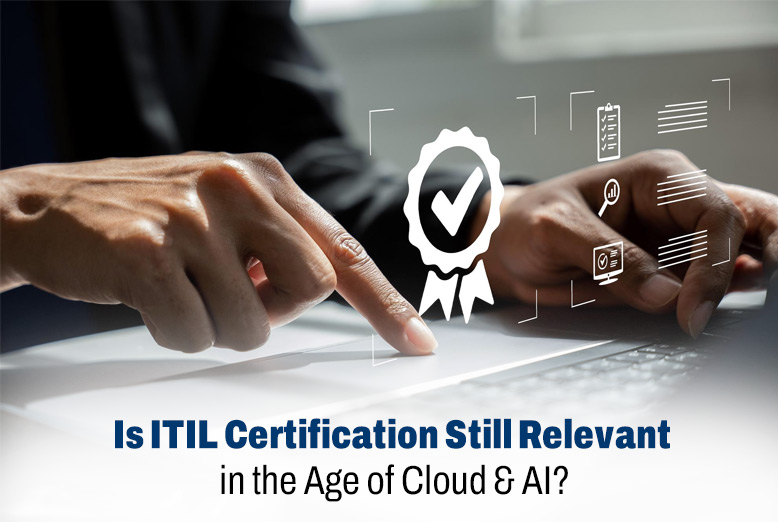Over the past decade, the technology world has changed remarkably. Companies are adopting cloud, AI and automation in order to increase efficiency, reduce costs and improve the customer experience. Amidst a time of constant metamorphosis, IT professionals may be asking themselves: is ITIL certification still valid?
The Information Technology Infrastructure Library (ITIL) has been widely accepted around the world as the de facto standard for IT service management since 1986. It is a structure to relate business requirements with IT service offerings, quality and reliability. But in a world where cloud-native platforms are taking off and AI-powered operations come to the fore, ITIL now is confronting new questions about relevancy.
In this post, we’ll look at how ITIL certification today fits into the digital landscape, what skills it offers its holders, how it complements modern practices, and why you might consider pairing a qualification like TOGAF certification with it if you’re looking for a career move in enterprise IT.
Understanding ITIL and Its Evolution
ITIL is a series of best practices for IT service management that the UK government came up with in the 1980s. It has gone through multiple incarnations over the years, with ITIL 4 being the most current release.
Key Features of ITIL 4
- Service Value System (SVS): Supports the service value chain and describes the activities of an organisation to enable management, operations, and execution of services.
- Principles: Emphasize value, balance visibility and collaboration, and be simple and pragmatic.
- Integration with Agile, DevOps, and Lean: ITIL 4 embraces change and aligns with modern methodologies.
This malleability is a big reason ITIL certification remains relevant in even an AI- and cloud-driven world.
Why ITIL Certification Still Matters
Bridging Business and IT
IT is no longer just expected to be a support function—it must deliver value for the business. ITIL enables IT teams to align with strategic objectives so that investments in cloud or AI technology can produce tangible results.
Cloud and ITSM
Cloud platforms automate much of infrastructure management, but businesses still require well-structured systems for service delivery, incident handling, and governance. ITIL provides that framework.
AIOps and Structure
AI-powered systems can automate monitoring, incident detection, and even ticket resolution—but only if they are built on clear workflows. ITIL facilitates the incorporation of AI into existing service management activities.
Flexibility and Integration
ITIL 4 incorporates contemporary practices such as DevOps and Agile. It offers guiding principles that can be adapted to new technologies.
Global Recognition and Career Growth
Global organizations continue to recognize ITIL certification. It proves that you can provide IT services using optimal processes, regardless of technology shifts.
What You Learn with ITIL Certification
- Service Strategy: Matching IT services with business needs
- Incident & Problem Management: Downtime minimisation and improved service reliability
- Change Management: Transitioning from legacy to cloud or adopting AI smoothly
- Service Design: Designing scalable processes for cloud-native architectures
- Kaizen: Using feedback loops for continual improvement
These are critical skills for any enterprise where technology must deliver lasting value.
ITIL Certification in the Cloud Era
Cloud Service Catalogs
Supports standardization and control of services in cloud environments.
Change Enablement
Ensures a formal process for approving and managing changes.
Hybrid Cloud Incident Management
Guides outage and incident handling across hybrid or multi-cloud setups.
Capacity & Availability Management
Ensures resources are right-sized and aligned with business needs.
ITIL and the AI Era
- AI-Based Incident Detection: ITIL governs processes, AI automates aspects.
- Predictive Maintenance: AI enhances ITIL’s continual improvement model.
- Service Automation: ITIL ensures automation aligns with business objectives.
- Ethical AI Use: Governance ensures AI is used responsibly and transparently.
ITIL vs TOGAF: Complementary Paths
- ITIL Certification: Focuses on IT service management and operational excellence.
- TOGAF Certification: Focuses on enterprise architecture and aligning IT with long-term business strategy.
Together, they ensure both operational execution (ITIL) and strategic planning (TOGAF).
Who Should Pursue ITIL Certification?
- IT Service Managers
- IT Support Professionals
- Cloud Experts
- AI/Automation Specialists
- CIOs
Despite cloud and AI advancements, the need for organized IT service management is not going away.
Career Opportunities with ITIL Certification
- IT Service Manager
- Change Manager
- Incident/Problem Manager
- Service Delivery Manager
- Cloud Operations Manager
- IT Project Manager
Pairing ITIL with TOGAF or cloud certifications (AWS, Azure) makes you an even stronger candidate.
Salary Outlook
- ITIL-certified staff earn 10–15% higher salaries than non-certified peers.
- Salaries typically range from $80,000 – $120,000/year.
- Senior roles (e.g., Service Delivery Manager, IT Director) can exceed $130,000/year.
Adding cloud, AI, or enterprise architecture skills increases earning potential further.
Future of ITIL Certification
Does ITIL still matter in 2025 and beyond? The answer is yes — but with supplements.
- Cloud Certifications (AWS, Azure, GCP): To handle modern infrastructures.
- AI/Automation Tools: For machine learning and IT automation.
- TOGAF Certification: For enterprise architecture and digital strategy.
ITIL remains the foundation, while these additional skills prepare you for a hybrid tech landscape.
Conclusion
The rise of cloud computing and AI has reshaped IT, but ITIL certification is still highly relevant in 2025. It provides structure, governance, and oversight for today’s complex IT environments.
For IT practitioners, ITIL is a gateway to better jobs and higher salaries. When combined with TOGAF, cloud, or AI certifications, ITIL positions you as a well-rounded leader ready for both operational excellence and strategic transformation.
Also Read : Why ITIL Foundation Certification Is a Must-Have for IT Professionals







